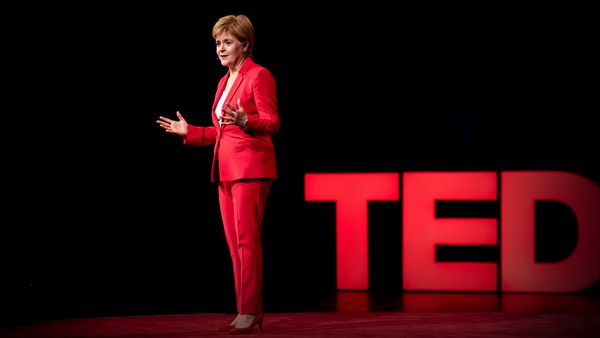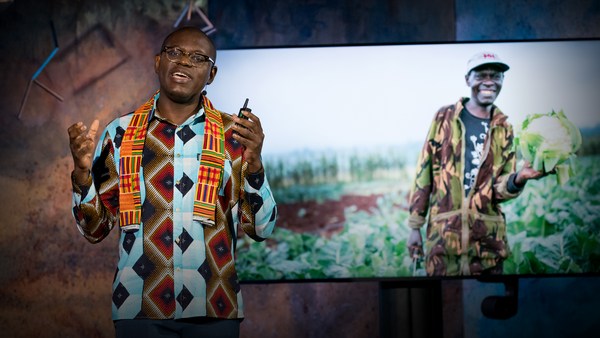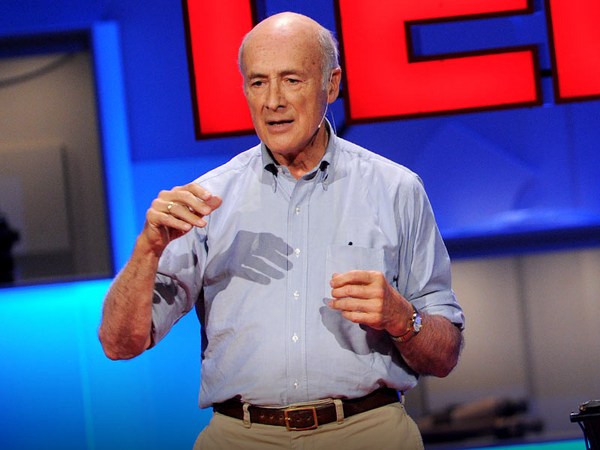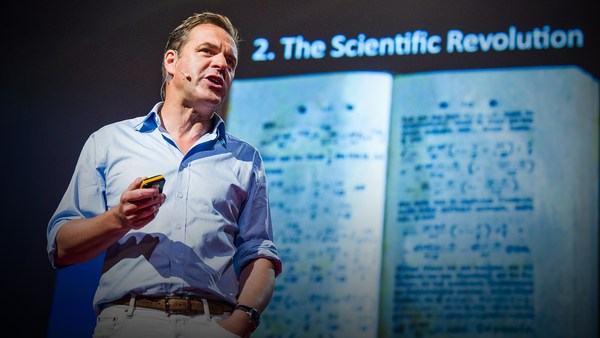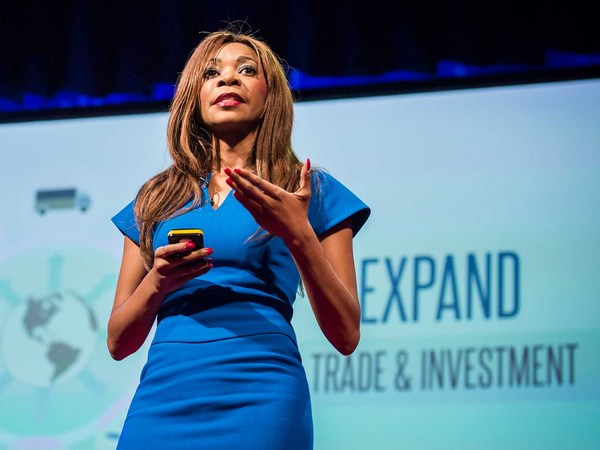We are at the end of globalization. We've taken globalization for granted, and as it drifts into history, we're going to miss it.
The second wave of globalization began in the early '90s, and it delivered a great deal. Billions of people rose out of poverty. More impressively, wealth per adult in countries like Vietnam and Bangladesh increased by over six times in the last 20 years. The number of democracies rose, and countries as diverse as Chile, Malaysia, Estonia, held free and fair elections. The role of women improved in many parts of the world, if you look at wage equality in countries like Spain, or access to education in countries like Saudi Arabia. Economically, supply chains spread like webs around the world, with car parts criss-crossing borders before the final product came into place. And globalization has also changed the way we live now. It's changed our diets. It's changed how we communicate, how we consume news and entertainment, how we travel and how we work.
But now, globalization is on its deathbed. It's run into the limitations of its own success: inequality and new, record levels of indebtedness -- for example, world debt-to-GDP is now pushing levels not seen since the Napoleonic Wars 200 years ago -- show us that the advantages of globalization have been misdirected. The Global Financial Crisis was the result of this mismanagement, and since then policymakers have done little but contain, rather than solve, the problems of our age.
Now, some highly globalized countries such as Ireland and the Netherlands, have managed to improve income inequality in their countries by better distributing the bounties of globalization through higher taxes and social welfare programs. Other countries have not been as good. Russia and, especially, the United States, have extreme levels of wealth inequality, more extreme even than during the time of the Roman Empire. And this has convinced many people that globalization is against them, and that the bounties of globalization have not been shared with the many.
And now, in 2020, we're confronted by the pandemic, which has shaken the ground under us and further exposed the frailties of the globalized world order. In past international crises, most of them economic or geopolitical, there has usually ultimately been a sense of a committee to save the world. Leaders and leading nations would come together. But this time, uniquely, there has been no such collaboration. Against a backdrop of trade wars, some countries like the US have outbid others for masks. There's been hacking of vaccine programs, and a common enemy, the pandemic, has not been met with a common response. So any hope that we might have a world vaccine or a world recovery program is in vain.
So now we're at the end of an era in history, an era that began with the fall of communism, that set in train the flow of trade, of finance, of people and of ideas, and that now comes to an end with events like the shutting down of democracy in Hong Kong.
The question now is, what's next? Well, if the era we're leaving was characterized by a connected world trying to shrink and come together on the basis of economic goals and geography, the new world order will be defined by rival, distinct and different ways of doing things, and ultimately collaboration based on values, and this new world order is very much a work in progress. "Disorder" might be a better word, and it has been for some time. But think appropriately of great sheets of ice breaking apart, some drifting away and others later reforming.
And the internet is a bit like this. It used to be global. Google used to have 30 percent of the market share in China, and now it has close to zero percent. And the big regions of the world increasingly look at the internet from a values-based point of view. America values tech innovation and its financial rewards. China takes a political view of the internet and cordons it off, and at the same time China has this incredible e-commerce economy that no other country has come close to matching. And then there's Europe, and in Europe a conversation about the internet is effectively a conversation about data and privacy. So there you have it: one common problem, and three increasingly different, competing views.
This shows us that rival ideologies will drive very distinct ways of doing things. But what about collaboration and cooperation? Well, I'm going to start with the example of three small countries: Scotland, Iceland and New Zealand. And a couple of years ago, they signed up to the Wellbeing Economy Governments, whose aim is to foster ecological and human well-being as well as economic growth. Practically speaking, these countries are already discussing things like well-being budgeting, well-being-led tourism, and using the well-being framework in the fight against COVID. Now, these three countries are about as geographically distant and diverse as you can get, but they've come together on the basis of a shared value, which is a common understanding that there is more to government policy than merely GDP.
Similarly, in the future, other small countries and city-states -- Singapore, Switzerland, the United Arab Emirates -- will find that they have more in common with each other than with their larger neighbors. They're all global financial centers. They all invest in strategic planning. And they are all geopolitical micropowers and will collaborate more as a result.
Another good example of how values, rather than geography, will increasingly shape destinies and alliances is Europe. During the period of globalization, one of the key phenomena was the eastward expansion of the European Union. From 2004, it added 13 new members, despite the near existential crisis of the euro, constant pressure from Russia, and of course the trauma of Brexit. And, like a company that has grown too fast, Europe needs to stop and think about where it's going and ask whether its values can steer it in the right direction. And this is beginning to happen, albeit slowly. European leaders talk a lot about European values, but frankly most Europeans, be they German, Greek, Latvian or Spaniards, really don't know or have a clear idea what those shared common values are supposed to be. So European politicians need to do a very good job of asking them how they feel about these common values and then communicating the answers back to them in a clear and tangible way. And of course social media is a very important tool to deploy here.
And as Europe moves [towards] a union that's based more on values and less on geography, its contours and those values themselves will increasingly be defined by the tension between Brussels and countries like Hungary and Poland, who are increasingly behaving in ways that go against basic values such as respect for democracy and the rule of law. The treatment of women and the LGBT community are other important markers here. And in time Europe will, and should, tie financial aid to these countries and policy to their adherence to Europe's shared values. And these countries, and others in Eastern Europe, and Cyprus, still have close financial ties to Russia and China. And again in time they will be forced to choose between Europe and its values and these other countries and their own distinct values.
Like Europe, China is another big player with a very distinct set of values, or contract between the people and the state. And I have to say that this set of values is not one that is well-understood in the West. And given China's extraordinary economic and social transformation in the last 30 years, we should really be more curious. China's values are rooted deep in its history, in a desire to regain the place it once enjoyed hundreds of years ago when its economy was the dominant one. Indeed, Xi Jinping talked of the China Dream well before Donald Trump was elected with the catchphrase "Make America Great Again." And China's system, viewed from the outside, is based around a contract or a bargain where people will sacrifice their liberty in return for order, prosperity and national prestige. It's one where the state is very much in control, which is something that most Europeans and Americans would find alien. It's also a system that has worked very well for China. But the biggest risk it faces is a period of high and prolonged unemployment that will break this contract between the state and the people.
And for other countries, China can be an attractive partner. It can provide capital and know-how. I'm thinking for example of Pakistan and Sri Lanka, two members of the Belt and Road program. But this partnership comes at a price; they're beholden to Chinese technologies such as the controversial Huawei. Chinese investors own their debt, and as a result control key infrastructure such as the main port in Sri Lanka.
Now I find that when we talk about globalization, the end of globalization and the new world order, we spend far too much time discussing America, Europe and China, and not enough time on the many exciting things happening in fast-growing economies, from Ethiopia, Nigeria, to Indonesia, Bangladesh, Mexico and Brazil. And in the new world order, the question for these countries is what model to follow and what alliances to build. And many of them during the period of globalization had become used to being told what to do by the likes of the IMF, the International Monetary Fund. But the age of condescension is now over, so the tangible opportunity in a less uniform, more value-driven world for these countries is that they have much greater choice in the path to follow, and arguably greater pressure to get it right.
So should, for example, Belarus and Lebanon follow the Irish model or that of Dubai? Does Nigeria still think it has shared values with the Commonwealth countries, or will it ally itself and its fast-growing population to China and its model? And then think of one of the few female leaders in Africa, President Sahle-Work Zewde of Ethiopia, and whether she might be inspired by the work of Jacinda Ardern in New Zealand or Nicola Sturgeon in Scotland, and tangibly how she can transfer their example to policy in Ethiopia. Of course, it may be that in this new world order, countries like Kenya and Indonesia decide to go their own way and build out their own value sets and their own economic infrastructure, and in this way the arrangements and the institutions of the future will be crafted much less in Washington and Beijing, but really by countries like Tunisia and Cambodia, comparing notes on how to battle corruption through technology, how to build education and health care systems for burgeoning populations, and how to make their voice heard on the world stage.
So as globalization ends and chaos seems to reign, these countries, their young populations and the scope they have to build new societies are the future and the promise of the new world order.
Thank you.
